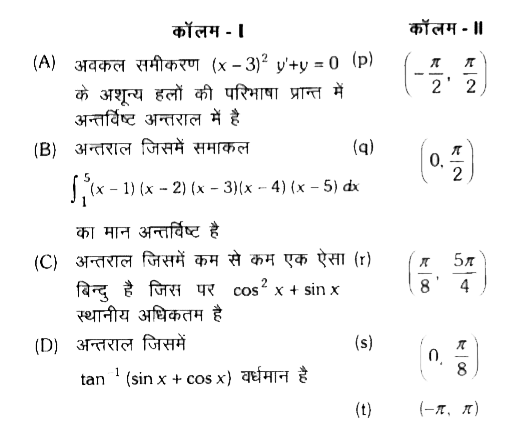यदि f (x ) एक धनात्मक सतत्त फलन हो तथा
F(x)=x∫0f(t)dt,∀x≥0 तथा f(x)≥cF(x) जहाँ c>0 तथा माना g:[0,∞)→Rएक फलन इस प्रकार है की
dg(x)dx<g(x)∀x>0 तथा g(0)=0
असामिका g(x)(cos−1x−sin−1x)≤0 के समुच्चय हलों की संख्या है।
[−1,1√2]
[1√2,1]
[0,1√2]
(0,1√2]
The correct Answer is:A
Step by step video, text & image solution for यदि f (x ) एक धनात्मक सतत्त फलन हो तथा F (x) = underset( 0) overset( x ) int f(t) dt , AA x ge 0 तथा f(x) ge c F (x) जहाँ c gt 0 तथा माना g : [ 0 ,infty ) to R एक फलन इस प्रकार है की (dg(x))/( dx) lt g(x) AA x gt0 तथा g(0)=0 असामिका g(x) (cos ^(-1) x - sin ^(-1) x) le 0 के समुच्चय हलों की संख्या है। by Maths experts to help you in doubts & scoring excellent marks in Class 12 exams.
Updated on:21/07/2023Topper's Solved these Questions
- अवकल समीकरण BOOK - ERRORLESS HINDICHAPTER - अवकल समीकरण EXERCISE - JEE Advanced ( Matrix Match type questions )
3 Videos
- अवकल समीकरण BOOK - ERRORLESS HINDICHAPTER - अवकल समीकरण EXERCISE - EXERCISE
109 Videos
- अनिश्चित समाकलन BOOK - ERRORLESS HINDICHAPTER - अनिश्चित समाकलन EXERCISE - JEE ADVVANCED (MATRIX MATCH TYPE QUESTIONS )
2 Videos
- अवकलन तथा अवकलज के अनुप्रयोगBOOK - ERRORLESS HINDICHAPTER - अवकलन तथा अवकलज के अनुप्रयोगEXERCISE - JEE Advanced (Matrix Match type questions)
22 Videos
Similar Questions

View Solutionसभी केंद्रीय वृतों जिनका केंद्र (h,k) है , के लिए अवकल समीकरण की कोटि है।
View Solutionकॉलम Iकॉलम II(A)यदि∫2x√1−4xdx=ksin−1(f(x))+C,(p)0तो k किससे महत्तम है(B)यदि∫(√x)5(√x)7+x6dx=a lnxkxk+1+c,(q)1हो, तो ak किससे न्यूनतम है(C)∫x4+1x(x2+1)2dx=k ln|x|+m1+x2+n,(r)3जहाँ n समाकलन का अचर है, तो mk किससे महत्तम है(D)∫dx5+4cosx=ktan−1(m tanx2)+C,(s)4 हो k/m किससे महत्तम है
View Solutionकॉलम I में दिये गये वक्तव्यों का कॉलम II में दिये अंतरालों अथवा अंतरालों के सम्मिलन से सुमेल करें
कॉलम -Iकॉलम - II(A)समुच्चय{Re(2iz1−z2):zएकसम्मिश्र संख्या है|z|=1,z≠±1}है(p)(−∞,−1)∪(1,∞)(B)फलनf(x)=sin−1(8(3)x−21−32(x−1))का प्रान्त है(q)(−∞,0)∪(0,∞)(C)यदिf(θ)=∣∣ ∣∣1tanθ1−tanθ1tanθ−1−tanθ1∣∣ ∣∣,तब समुच्चय{f(θ):0≤θ<π2}है(r)[2,∞)(D)यदिf(x)=x3/2(3x−10),x≥0,तबf(x)किसमे वर्धमान है(s)(−∞,−1]∪[1,∞)(t)(−∞,0]∪[2,∞)
View SolutionLet f and g be differentiable functions such that: xg(f(x))f'(g(x))g'(x)=f(g(x))g'(f(x))f'(x)∀x∈R Also, f(x)>0 and g(x)>0∀x∈R∫x0f(g(t))dt=1−e−2x2,∀x∈R and g(f(0))=1,h(x)=g(f(x))f(g(x))∀x∈RNow answer the question:f(g(0))+g(f(0))= (A) 1 (B) 2 (C) 3 (D) 4
View SolutionLet f(x) be a non-positive continuous function and F(x)=∫x0f(t)dt∀x≥0 and f(x)≥cF(x) where c<0 and let g:[0,∞)→R be a function such that dg(x)dx<g(x)∀x>0 and g(0)=0
The total number of root(s) of the equation f(x)=g(x) is/ are
View SolutionLet f(x) be a non-positive continuous function and F(x)=∫x0f(t)dt∀x≥0 and f(x)≥cF(x) where c<0 and let g:[0,∞)→R be a function such that dg(x)dx<g(x)∀x>0 and g(0)=0
The number of solution(s) of the equation
∣∣x2+x−6∣∣=f(x)+g(x) is/are
View SolutionLet f(x) be a non-positive continuous function and F(x)=∫x0f(t)dt∀x≥0 and f(x)≥cF(x) where c<0 and let g:[0,∞)→R be a function such that dg(x)dx<g(x)∀x>0 and g(0)=0
The solution set of inequation g(x)(cos−1x−sin−1)≤0
View Solutionदिखाएँ कि ∫a0f(x)g(x)dx=2∫a0f(x)dx, यदि f तथा g निम्न प्रकार परिभाषित है ।
f(x)=f(a−x) तथा g(x)+g(a−x)=4.0
View Solutionयदि फलन f तथा g निम्न प्रकार परिभाषित हो, तो fog तथा gof ज्ञात कीजिए:
f(x)=logx,g(x)=ex
View SolutionIf f(x) is a quadratic expression such that f(x)gt 0 AA x in R , and if g(x)=f(x)+f'(x)+f''(x) , then prove that g(x)gt 0 AA x in R .
View SolutionLet f(x) be a non-positive continuous function and F(x)=∫x0f(t)dt∀x≥0 and f(x)≥cF(x) where c<0 and let g:[0,∞)→R be a function such that dg(x)dx<g(x)∀x>0 and g(0)=0
The total number of root(s) of the equation f(x)=g(x) is/ are
View SolutionLet f(x) be a non-positive continuous function and F(x)=∫x0f(t)dt∀x≥0 and f(x)≥cF(x) where c<0 and let g:[0,∞)→R be a function such that dg(x)dx<g(x)∀x>0 and g(0)=0
The number of solution(s) of the equation
∣∣x2+x−6∣∣=f(x)+g(x) is/are
View SolutionLet f(x) be a non-positive continuous function and F(x)=∫x0f(t)dt∀x≥0 and f(x)≥cF(x) where c<0 and let g:[0,∞)→R be a function such that dg(x)dx<g(x)∀x>0 and g(0)=0
The solution set of inequation g(x)(cos−1x−sin−1)≤0
View Solutionयदि f(x) एक द्विघात व्यंजक इस प्रकार है की f(x)>0∀x∈R तथा यदि g(x)=f(x)+ddx(f(x))+d2dx2(f(x)) तो सिद्ध कीजिए g(x)>0∀x∈R
View Solution
